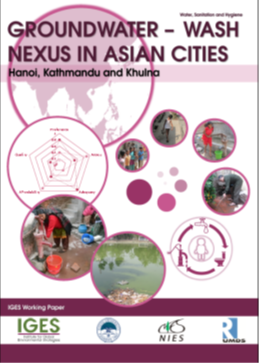Groundwater WASH nexus in Asian cities: Hanoi, Kathmandu, Khulna
 This working paper assesses the groundwater-WASH (Water, Sanitation and Hygiene) nexus based on an analysis of domestic water uses in three groundwater dependent Asian Cities: Hanoi (Viet Nam), Kathmandu (Nepal), and Khulna (Bangladesh). The paper analyses the pull (benefits) and push (constraints) factors for use of groundwater by residents in these cities based on five decision criteria: preference, access, adequacy, affordability and quality. The study has found a close linkage between groundwater and WASH. Groundwater plays a critical role in improving access to WASH in the three cities. The study finds that groundwater is one of the primary choices or the only source of water for residents in the studied cites. Access to groundwater was the primary pull factor in all cities to overcome the water supply deficit resulting from a lack of piped water connection or unreliable supply. Poor groundwater quality was the major push factor identified in all the cities. Due to quality concerns, residents were reluctant to use groundwater for direct consumption.
This working paper assesses the groundwater-WASH (Water, Sanitation and Hygiene) nexus based on an analysis of domestic water uses in three groundwater dependent Asian Cities: Hanoi (Viet Nam), Kathmandu (Nepal), and Khulna (Bangladesh). The paper analyses the pull (benefits) and push (constraints) factors for use of groundwater by residents in these cities based on five decision criteria: preference, access, adequacy, affordability and quality. The study has found a close linkage between groundwater and WASH. Groundwater plays a critical role in improving access to WASH in the three cities. The study finds that groundwater is one of the primary choices or the only source of water for residents in the studied cites. Access to groundwater was the primary pull factor in all cities to overcome the water supply deficit resulting from a lack of piped water connection or unreliable supply. Poor groundwater quality was the major push factor identified in all the cities. Due to quality concerns, residents were reluctant to use groundwater for direct consumption.
